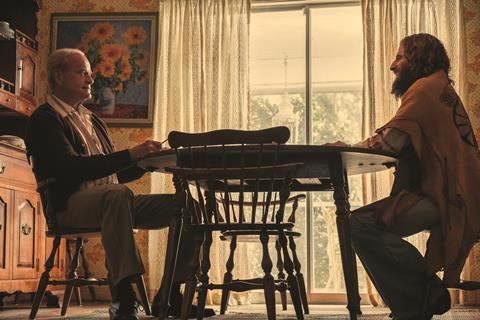After a record-breaking run in the US, Jesus Revolution is showing in UK cinemas from today. Our film reviewer says its the best Christian film he’s seen

Every once in a while, a good film targeted at Christians comes along in the US and, each time, the industry is shocked that there is an audience for quality, Christian storytelling.
The latest of these ‘surprise’ hits is Jesus Revolution, a film that earns the accolade of being one of the best Christian films I’ve seen. It still lacks the weight of ideas and the craftsmanship of the best mainstream cinema – films like this won’t be playing at Cannes any time soon – but it’s a satisfying story told well, with some genuine insight into the Church then and now. It’s a shame, then, that this effective piece of storytelling is still a huge missed opportunity. It’s a film haunted by the real history of the era and the potential of what could have been.
Jesus Revolution tells the story of the Jesus Movement of the 1960s and 70s that saw tens of thousands of hippies trade hallucinogenics for hallelujahs as they encountered the gospel for the first time. Greg Laurie, an evangelist, church leader and the film’s screenwriter, became a Christian during this remarkable move of the Spirit, so he tells the story from his own perspective, documenting his encounter with the hippie movement, his time with the odd-couple pairing of Lonnie Frisbee and Chuck Smith, and his own beginnings as a church leader.
At the time, Smith was leading the shrinking congregation of Calvary Chapel in Orange County, California; even his daughter wanted to ditch church in favour of something more relevant. When she brings home the charismatic – in both senses of the word – Frisbee, Smith and the chapel are both transformed. Soon the church, and its nearby beach, become a frenzy of salvations, baptisms and miracles. Some are quick to judge these unwashed converts with their histories of drug use and free love, while others see an outworking of the grace of God.

The ace in the hand of Jesus Revolution is its terrific cast, who transform the narrative from a history lesson into a moving, thoughtful drama. Casting Kelsey Grammer is a coup for the film, the erstwhile Frasier capturing both the weariness of a struggling pastor and the joy of seeing new life. The heart and soul of the film, however, is Jonathan Roumie as Frisbee. Thankfully he already looks the part, fresh from playing Jesus in The Chosen. But even if they do look alike, Frisbee is a very different role (keep an eye out also for a funny cameo from Paras Patel, who plays Matthew in the same series). Roumie captures Frisbee’s relaxed, stoner drawl perfectly, as well as his gentleness, playing the character with a charismatic twinkle in his eye.
The film is at its strongest when Grammer and Roumie are on the screen together, which happens far more in its first hour. That’s when we see the barriers of polite Christianity exemplified by Smith slowly being broken down by the chaotic, surprising grace shown in Frisbee. This tension, as the church begins to transform and the movement takes off, is where the richest drama lies. It’s hard not to hear echoes of today when, early on, Smith writes off an entire generation as depraved in one of his sermons. To him, hippies are something to be feared. Take out ‘hippies’ and insert a term such as ‘the woke left’ and suddenly the film feels incredibly relevant. This insight alone makes the film worthwhile, and I’m certain that many Christians will resonate with its message of how the gospel crosses social boundaries.

Not everything works, however. The actual depiction of hippie culture is deeply sanitised, in order to not offend the Christian audience and there is little exploration of their real desires, fears or motivation. Their portrayal as a group who seemingly exist solely to ‘be converted’ is a shame, as it undermines some of the nuance of the film’s cultural commentary. The second hour also flounders a little as the focus shifts from this new movement to Laurie’s own story. His journey to becoming a pastor and finding a wife are sadly not as interesting as everything that has gone before.
Most frustratingly, it also sanitises Frisbee himself. There is absolutely zero mention of the sexual abuse he suffered, or the secret relationships he had with men even while he was evangelising. Instead, the most complexity we get is that he could maybe be a bit arrogant and oblivious, occasionally elevating himself rather than Jesus. This is sad, because within the true story of Frisbee and Calvary Chapel lies something more complicated and real than the film is prepared to show.
The screenplay sacrifices the knottiness of human relationships for something far more straightforward and, ultimately, it suffers as a result, becoming more like a sermon than art. Frisbee was a man who opened people’s eyes to the radical grace of God while living a secret life and having furtive relationships with men. However that statement makes you feel, wrestling with this reality would make for a far more interesting film and lead to a richer understanding of how God relates to the people he loves.

Jesus Revolution is in UK cinemas from today jesusrevolutionmovie.co.uk





































1 Reader's comment